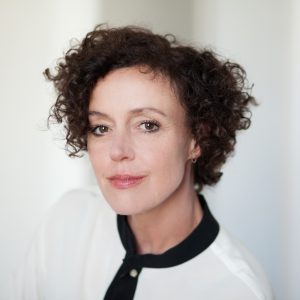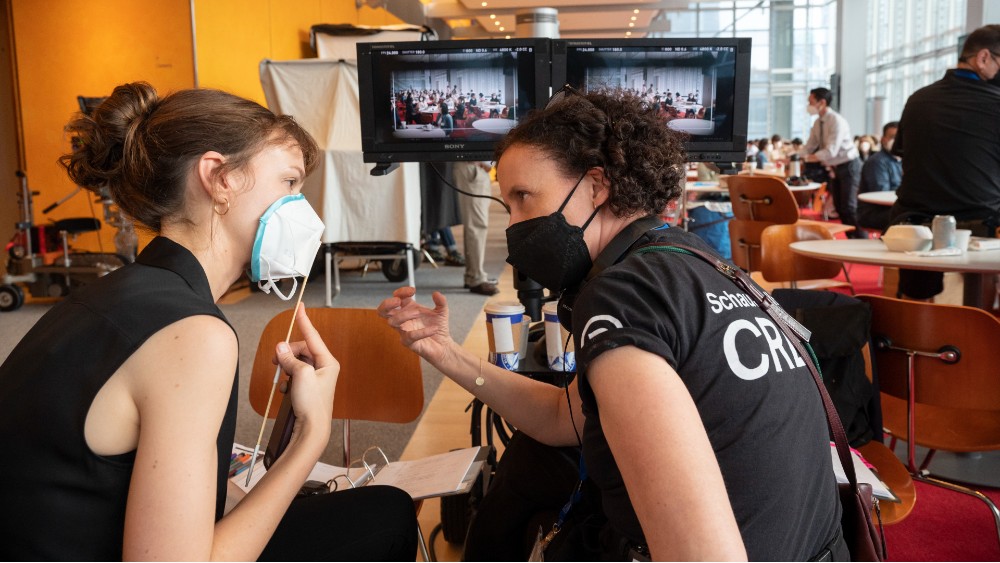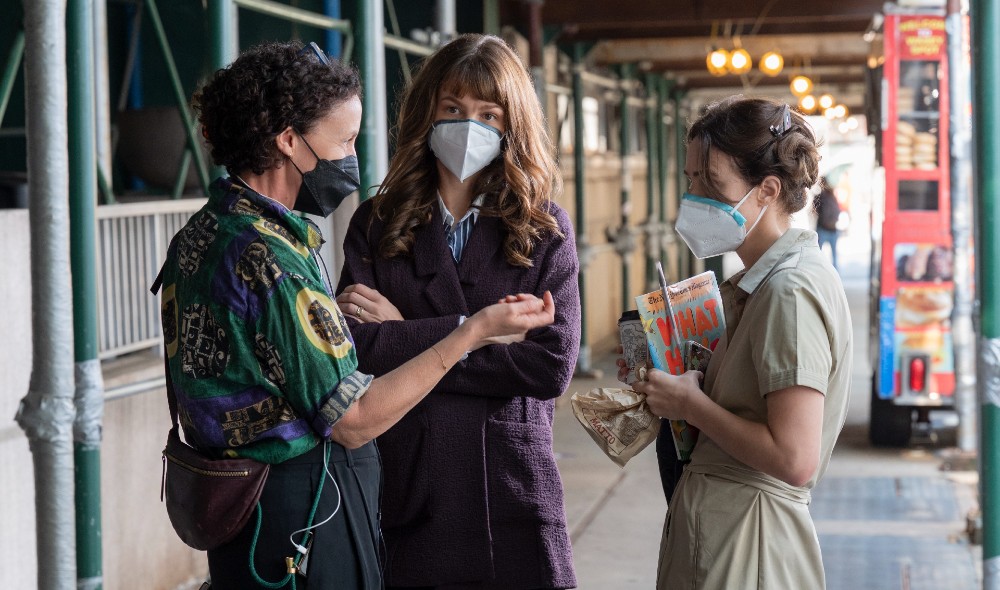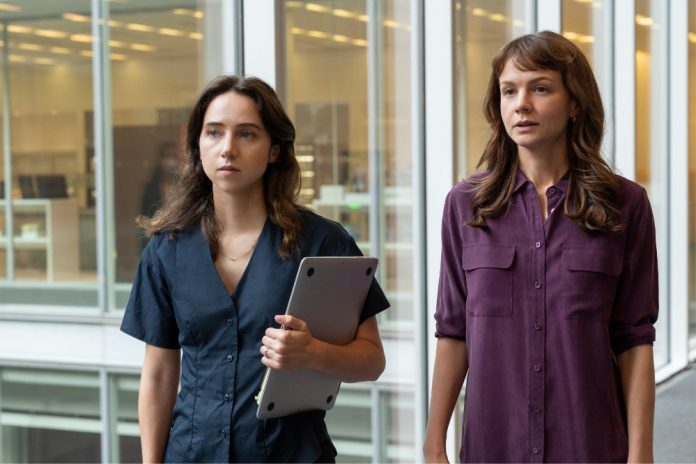It’s hardly hyperbole to say that Maria Schrader’s She Said is one of the most powerful and important movies of the year, as it follows the New York Times‘ investigation into celebrated producer Harvey Weinstein, who was committing rape and sexual assault for years — right under Hollywood’s proverbial nose.
In early 2017, journalists Megan Twohey and Jodi Kantor took on the difficult story, which would serve as the spark that would bring about important change, not just in Hollywood, but in multiple industries that were forced to grapple with the #MeToo movement. The two reporters told their story, and the stories of numerous Weinstein survivors, in their 2019 book, She Said: Breaking the Sexual Harassment Story That Helped Ignite a Movement.
The book was quickly optioned by Plan B’s Dede Gardner, who brought the project to Universal, a studio known for both championing female-driven stories and backing female filmmakers. The studio cast two-time Oscar nominee Carey Mulligan and Emmy nominee Zoe Kazan as Twohey and Kantor, respectively, and then stood back and allowed Schrader to do her thing.
After a lengthy career in front of the camera, Schrader received attention for directing the Netflix miniseries Unorthodox, for which she won a Primetime Emmy, while her previous film, I’m Your Man, was Germany’s selection for the Oscars last year. In a sense, She Said is Schrader’s first American feature film, and she handled the challenging material quite beautifully, surrounding Mulligan and Kazan with a fantastic group of veteran actors, including Patricia Clarkson, Andre Braugher, Samantha Morton, and Jennifer Ehle. (You can read Kim Voynar’s review here.)
Above the Line recently spoke with Schrader over Zoom, and the German filmmaker talked about how she set out to tell this story with both great sensitivity and specificity.

Above the Line: The Harvey Weinstein story was huge when it broke in 2017, but Megan and Jodi’s book didn’t come out until 2019. Were you aware of the book being written even before it was published?
Maria Schrader: I was not aware of the book. [Producer] Dede Gardner made me aware of it in our first meeting. She vaguely spoke about this project, and then, [at] the beginning of ’21, she sent me the script. I first read the script, and then I read the book. The book just got translated into German and will come out now, simultaneously with the movie, in Germany.
ATL: What was it about this project that made you want to take it on?
Schrader: Well, it was an interest in multiple layers. First of all, the story itself had an impact on me, as [it did] on all of us. I lived through the weeks and months after it was published, and I was very involved in ongoing conversations. It had an incredible impact on my life and my reframing of what I lived through [over] the decades. I’ve been on stage since I was 16, and what we used to consider [normal]… I had no idea who Jodi Kantor or Megan Twohey were, but this script offered [a chance] to tell how their story came about. I remember reading it breathlessly — the script by then was already so intelligent, and so complex. It interested me in so many aspects because it also reaches beyond the specifics of the Hollywood industry.
In a broader way, it asks the question, “What is it like to live and work as a woman in a male-dominated society?” That, of course, speaks to people all over the world. The fact that Megan and Jodi, for instance, entrusted us to include the private sides of their lives during this investigation, to see them as working mothers and see them struggling, as we struggle… It’s a fantastic opportunity to portray, for the first time, two female journalists — fierce and professional — in the center of a Hollywood story, and at the same time, portray them as human beings taking the subway, having doubts, being hit by depression in moments they didn’t expect… This is something I had not seen, [and it] was extraordinary, and I’m so grateful [to have been] asked to be part of it, and direct it.
ATL: I feel like we’ve seen movies about strong women and movies about journalists, but we rarely get to see their private lives or how the work intersects and often conflicts with them.
Schrader: Someone just told me that either one or both of [Bob] Woodward and [Carl] Bernstein, by the time they investigated their Watergate story, already had a family, which was probably consciously left out of the movie. I have to research this, but in that movie [All the President’s Men], they’re the lonely wolves with one mission in life, which, of course, makes them [larger] than life. Don’t get me wrong, I love that movie, but in this particular case — and I think it also depends on the specific subject matter Jodi and Megan were investigating — it also speaks to their private side. It’s not a subject matter you easily leave [behind] in the newsroom, and then go home and have a comfy evening. They met people who had trusted them with their most traumatic personal experiences because Jodi and Megan told them, ‘You’re in good hands with us, and we will try to change things.’ It resonates in our private sides of existence, not only [on] the professional side.

ATL: The whole cast is great, including Andre Braugher and Patricia Clarkson, but also the survivors, like Jennifer Ehle and Samantha Morton. But let’s talk about Carey and Zoe first. I imagine that every young actress in town was interested in playing either Megan or Jodi, so why did you decide the two of them were right for those roles?
Schrader: First of all, there are some undeniable specifics about this project. Every character is a living person, so, of course, it’s a very interesting dialogue you have with the fantastic Francine Maisler, our Casting Director, and with Dede Gardner. What is it we are really looking for? Is it [a] physical resemblance? Maybe a little bit, but specifically, with Jodi and Megan, it’s two different people [who] then have to team up and echo this specific energy and tension between them, so you can look at them as a team, also.
Despite the fact [that] everyone we considered for every role was a fantastic actor, for these two main characters, you needed actors who are also believable [as] intellectuals [who are] working with words every day. [It’s] undeniable in the New York Times newsroom, [but] this is not necessarily a given. The moment these names came up, I couldn’t think of anyone else any longer. This is also what you seek as a director — to encounter the one and only possibility, this secure feeling that I want it this way. I then had Zoom meetings with Carey, and then Zoe. I knew they knew each other [already], but that didn’t necessarily mean that they liked each other [laughs]. I then found out they were close friends, so [they] seemed to just be the one and only choice, and I was so happy to be working with them.
ATL: The film has an interesting dynamic since we do get to see Megan and Jodi together, but then they go off on their own reporting adventures, and Jodi especially, is flying all over the place to speak with sources. How did you work out the scheduling with all those different locations outside of the New York Times newsroom?
Schrader: Thank god there were a lot of knowledgeable people [who were] scheduling this. I had wonderful collaborators, but what you say is true. It’s sometimes even more difficult for an actor to come in for only one scene or two, and there are a lot of fantastic, incredibly talented, and gifted actors — heavyweights — coming in and contributing [a lot], just with one scene. I think I spent most of my time [during] prep studying the work of actors [and] discovering [other] actors who I had not known before. I consider it one of the most important parts of my work, to invite the right people to be part of it, [both] in front of the camera and behind the camera.

ATL: Did you actually get to film inside the New York Times offices? If not, your art department did an amazing job recreating that iconic location.
Schrader: It is the real venue. The New York Times opened their doors for the first time for a feature film. It was incredible to shoot there, and it’s probably the only silver lining of COVID — all the reporters were working from home. When I finally got to New York — very belated, also because of COVID — it was this incredible, immense space, architecturally designed by Renzo Piano to reflect the transparency of these institutions, all these glass windows. Visually, it’s incredibly interesting, but then it was also a huge empty space. All the reporters were gone, so every person you see in the venue is a background actor.
Again, my great team and I started looking for people [who’d be] able to portray these A-class journalists, and we just got the most beautiful crowd — it was wonderful to work with them. Most of them had seen the [NYT] documentary The Fourth Estate, and it was a great responsibility for everyone involved the moment the New York Times entrusted us to film in their venue [in order] to really depict their workplace and the details of this kind of work with accuracy and reality.
ATL: This might be a question for Universal’s legal team, but has anyone reached out to you about some of the real people portrayed in the movie, especially those who were involved directly with Harvey Weinstein?
Schrader: I can tell you that two people reached out to me in a very positive way during the process of shooting, but I will not disclose who they were.
ATL: That’s fair. Now that this movie has been screened at both the New York Film Festival and AFI Fest, what sort of reactions have you received from people who have seen it?
Schrader: I saw the movie for the first time with an audience at the premiere at the New York Film Festival, and it was quite an emotional experience. I spoke to people who have been emotionally involved, and I think it had quite an impact on the audience when I was present. I was grateful for the people coming up to me. I think it’s still a reminder, and people feel inspired and touched. It’s a little awkward to say that about my own movie, but I was very pleased to see people’s reactions.
She Said is now playing in theaters nationwide.



